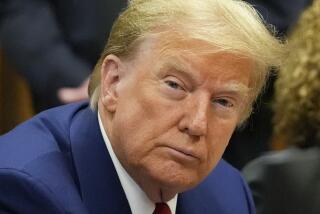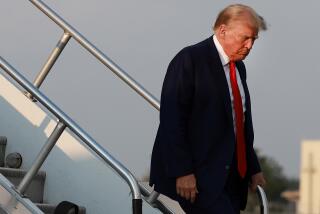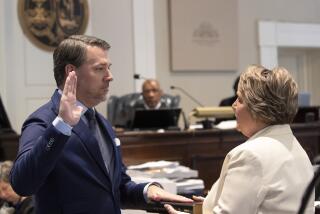McVeigh Asks Judge to Delay His Execution
- Share via
WASHINGTON — After earlier declaring he was ready to die, Timothy J. McVeigh decided Thursday to seek a postponement of his execution because, according to his lawyers, the convicted Oklahoma City bomber said he wants to “promote integrity in the criminal justice system.”
McVeigh is scheduled to die in 10 days. His attorneys in Denver filed a lengthy appeal Thursday asking that the execution date be set aside because the FBI and federal prosecutors have only recently turned over to the defense thousands of pages of investigative files.
Racing the clock, U.S. District Judge Richard P. Matsch, who sentenced McVeigh to death four years ago, ordered the government to respond to the defense request by Monday afternoon and warned the FBI not to go back and re-interview witnesses or encourage them not to cooperate with defense lawyers.
“There are a lot of accusations about that agency and the conduct of its people,” Matsch said in his Denver courtroom. “I want to be confident this word gets out.”
Matsch then announced that he will hold a hearing Wednesday morning on the request for a stay of execution--a sign he does not want to let McVeigh’s uncertain fate tick down to the last hour.
The sudden move by McVeigh, who as far back as December began saying he wanted to drop all of his appeals and face execution, means that Matsch ultimately must decide whether to delay the June 11 execution and, possibly, order even more hearings into whether McVeigh received a fair trial.
It also signals that, even this close to his planned execution, McVeigh is still willing to gamble with his fate.
The 33-year-old mass murderer has said he would rather be executed than serve a term of life in prison without parole. But many legal experts say that, at most, that is precisely what he could get if his death sentence is reduced.
McVeigh also fancies himself a revolutionary willing to give his life as a martyr for his anti-government cause, and any reprieve in his case could seriously weaken that image. Moreover, McVeigh, who was initially scheduled to die May 16, would have become the first federal prisoner executed in nearly 40 years. A delay would mean that distinction could go to Juan Raul Garza, a convicted drug dealer now set to die June 19.
“This decision was not easy for Mr. McVeigh,” said his attorney Rob Nigh, emerging from a two-hour meeting at the federal death row in Terre Haute, Ind. “He had prepared to die, and he was ready to die on May 16.”
But Nigh said that, while McVeigh does not wish to further hurt the victims and families of the 168 people killed and 500 injured in the bombing, he decided “upon principle” to hold the Justice Department accountable for not sharing the files with the defense. It has become a major embarrassment for a federal government that McVeigh hates.
Indeed, the defense team announced Thursday that they are still receiving copies of FBI files, including one witness statement turned over Wednesday, despite assurances a week ago from Atty. Gen. John Ashcroft that everything had been made available.
Defense lawyers refused to characterize the new document, citing a protective order sealing all of the material, although one defense attorney, Chris Tritico, said, “We believe it has merit on Mr. McVeigh’s case.”
A copy of a portion of that file, dated April 15, 1997, and obtained by The Times, is an FBI interview with J. D. Cash, a small-town Oklahoma newspaper reporter who long has pushed conspiracy theories in the bombing.
Cash told the FBI that in May 1995 “he received a tip . . . that Dennis Mahon was involved in the bombing of the Murrah building in Oklahoma City,” according to the file.
Authorities have identified Mahon as a white supremacist from Oklahoma, and the government later decided it did not believe he had a role in the bombing.
Ashcroft, meanwhile, echoed his position that there is nothing new in the files to suggest McVeigh is innocent. He said his office “is prepared to oppose any attempts by Timothy McVeigh to overturn his conviction and sentence or to force a new trial.”
The attorney general, in the statement released in Washington while he was traveling in Europe, also noted that McVeigh has confessed to the April 19, 1995, bombing of the Alfred P. Murrah Federal Building--the worst act of terrorism in America.
“Based on overwhelming evidence and McVeigh’s own repeated admissions, we know that he is responsible for this crime,” Ashcroft said, “and we will continue to pursue justice by seeking to carry out the sentence that was determined by a jury.”
Tritico, speaking on the courthouse steps in Denver just after the defense filed the appeal, responded: “We’ll address Gen. Ashcroft’s comments when we get into a courtroom.”
Matsch moved the trial to Denver after ruling that a fair jury could not be found in Oklahoma.
In their filing, the defense team asked for a second stay of execution and also for an evidentiary hearing in which the government would have to show “why it cannot produce all remaining investigative documents and information that are still being withheld from the defense.”
They said that “there is substantial reason to believe” that some of the FBI evidence was “intentionally destroyed or not documented.” They did not elaborate on that allegation.
The defense team also argued that the government had perpetrated a “fraud upon the court” by not sharing all of their files, even though they were supposed to do so under a pretrial agreement between the two sides.
The defense lawyers included a quote from the judge himself during a pretrial hearing in which Matsch said everything must be turned over to the defense.
“The failure to comply,” the judge said, “. . . is not excused by any inconvenience, expense, annoyance or delay.”
The McVeigh lawyers also cited several quotes from prosecutors in court in which they said everything was being turned over. For instance:
* “Simply put, the prosecution has disclosed all materials and information.”
* “McVeigh has been given virtually all evidence . . . that the FBI and other investigating agencies gathered in connection with the bombing investigation.”
* “We have disclosed our entire investigation in this case. . . . I realize this is probably the biggest investigation in the history of the country, where the entire investigation has been turned over to the defense.”
Outside the courthouse Thursday, assistant prosecutor Sean Connelly said, “We categorically deny there was any fraud on the courts.”
In announcing their legal moves, Nigh said that McVeigh first had to agree to reopen his appeals.
“It is upon principle Mr. McVeigh has decided to seek court relief, and it is based upon the government’s failure to produce evidence in this case,” Nigh said. “He is convinced that the Department of Justice and the FBI will not otherwise be held to account unless he takes this action.”
He said McVeigh “has asked us to say” that he hopes his decision does not further hurt his family, the victims and their families, and the community of Terre Haute, which is expecting an onslaught of protesters and journalists for the execution.
“His decision in no way stems from a desire to cause these people any additional pain or trauma,” Nigh said. “It is Mr. McVeigh’s belief that this action is necessary in order to promote integrity in the criminal justice system.”
Nigh and other members of the defense team said they are worried that additional documents may still be out there, beyond the 4,000 belatedly turned over in recent weeks.
“Some of those documents may well be being kept in other case files,” Nigh said. “But it is quite clear to us that people have been investigated carefully by the FBI and they have never produced one piece of paper concerning those people, and we must get to the bottom of this.”
Added defense lawyer Richard Burr, who also met with McVeigh: “There are some people that we are just now discovering were investigated that we did not know about.
“That knowledge comes from the new documents that have come since the middle of May. There are people that we have known about for some time that we had anticipated we would see paper on, and there is nothing.”
Burr noted, for instance, that in a separate trial for Terry L. Nichols, who was sentenced to life in prison as McVeigh’s collaborator, a witness testified about seeing a Ryder rental truck and four other vehicles at a lake on the day the bomb ingredients were mixed and loaded into the truck.
That is inconsistent with evidence presented at the McVeigh trial that just he and Nichols built the bomb.
And yet, as Burr said, “the witness was deemed to be credible by the jury” in the Nichols trial, and some of the jurors said after deciding not to sentence Nichols to death that they believed other people might have been involved.
“That,” Burr said, “is a starting point for where we are right now in court.”
More to Read
Sign up for Essential California
The most important California stories and recommendations in your inbox every morning.
You may occasionally receive promotional content from the Los Angeles Times.










